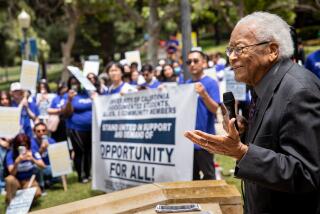UNDERSTANDING THE RIOTS--SIX MONTHS LATER : Touched by Fire / A Legacy of Pain and Hope : THE DEFENDERS : One Became a Hero; One Wants More Firepower
For many Californians, the riots were more than a momentary blip on the screen--they were a flash point for lasting and fundamental changes in their lives. The devastation left a legacy of broken dreams for many, awakened a sense of social justice in some, unleashed anger and hatred in others, and rekindled a spirit of hope among others. Six months after the riots, Times reporters visited some of the people and places touched by the extraordinary events of last spring and on these pages we tell their stories.
Art Washington still can’t get over what happened to him in the weeks after the riots--how he, the son of a Mississippi sharecropper, became a national hero.
“It’s changed my whole attitude about people,” he says. “Especially white people. I was real negative about white people because it seemed all my life they were trying to keep me down.”
Washington marched out of obscurity on the second day of the riots.
Waving a hammer and yelling in a hysterical, sobbing voice that bespoke a lifetime of hard work and hard times, he charged at a crowd of people who had looted his store and others in a mini-mall at Western Avenue and 20th Street near the Santa Monica Freeway.
He was frightened and frantic. He had watched police push the mob to the opposite side of 20th Street, but the looters were still throwing rocks and pieces of glass. When he could stand the tension no longer, he charged into the street, begging the looters to back off:
It’s not RIGHT what you’re doing!
I came from the ghetto too!
Why destroy MY business?
I tried to make it!
Can’t y’all SEE it?
The scene of anguish--one of the most emotional moments recorded during the riots--was broadcast on a network TV news program while the city was burning. In the next few weeks, hundreds of people from all corners of the country wrote Washington impassioned letters of support and sent tens of thousands of dollars.
A Hollywood producer telephoned from France and sent Washington a contribution to rebuild his business. A Costa Mesa businessman replaced his two stolen computers. A Newport Beach businessman offered to finance a youth training program out of Washington’s store.
In Cleveland, investment banker Mark Tiefel felt “something inside of me triggered” by the TV image. He called Washington, express-mailed him $1,500 and began a campaign to raise more. In one day, Washington received 78 checks from Cleveland residents.
A TV commentator in Cleveland said: “It is Art Washington, not Rodney King, who we should learn from and honor.”
Washington, a tall, bald, barrel-chested man, had spent almost 20 years building his pest control business. He had financed it through a second mortgage on his large, comfortable, two-story home, located a couple blocks from the shop on a now-decaying street. He and his wife raised four children there and gradually expanded the business until Washington had 7,000 customers.
The riot ransacked the stability they had struggled to attain.
The letters that began arriving in the ensuing weeks--about 300 in all, written almost entirely by whites--restored it.
“I was crying for the pain you must be suffering,” wrote a woman from Dublin, Ohio. “It is something I will never forget.”
“You are a man of honor and worthy of respect. I am a 32-year-old Westside white man and I have a lot to learn from gentlemen like you,” wrote another.
There were some days when Washington was in tears as he read the letters.
“I didn’t want anybody in the office to see me cry. I had to get up from my desk and go into the bathroom and cry,” he said.
“There was a classroom, somewhere in Ohio, of 7- and 8-year-olds, and each child wrote a letter. They raised five dollars and sixty-odd cents.
“To be honest, when the letters first started coming, I was looking inside them for the checks. But as time went on, as I kept reading, I forgot about the money.
“One man, an older white man, came into my store--he wasn’t a customer--and told me, ‘You don’t know how you’ve changed my life.’ How could I possibly do anything to change his life? He said, ‘Here’s a $500 check.’ ”
To replace windows, computers and supplies, Washington applied to the Small Business Administration for a $50,000 loan but was turned down--like many small business owners--on the grounds that the business did not appear profitable on paper. Eventually a $19,000 loan was approved. The donations--Washington declines to specify the total--covered the rest of his losses.
These days Washington is still pursuing his dream of expanding his business to additional locations, and he has added a new one: He hopes to someday own a shopping center. Some of the calls of support he received were from sympathetic businessmen promising to lend expertise if he ever needed it.
His optimism is tempered by the fact that as he drives the few blocks from his home to his shop every day, he must pass through the intersection of Washington Boulevard and Western Avenue, where the ruins remain of two other mini-malls destroyed by rioters.
“It reminds me,” he says. “Vacant lots where stores used to be. I don’t know where a drugstore is at.”
He says he understands, after wrestling with the question, why he became such a momentarily powerful symbol.
The Rodney G. King verdict persuaded many whites to finally accept black complaints of society’s racial injustices, he says. And in the terror of the riots, when many whites were desperate to make that sentiment known, he just happened to appear on their television screens.
“They needed somebody to focus on,” Art Washington says, “and they saw me.”
More to Read
Get the L.A. Times Politics newsletter
Deeply reported insights into legislation, politics and policy from Sacramento, Washington and beyond. In your inbox three times per week.
You may occasionally receive promotional content from the Los Angeles Times.










